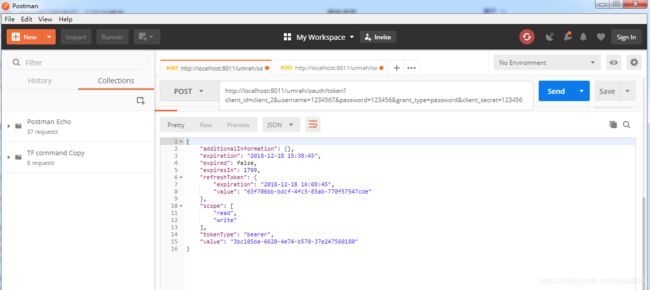SpringBoot 整合 Spring Security OAuth2 基于数据库实现
看这篇之前,相信你对SpringBoot,Spring Security,OAuth2都有个大概的了解,什么?不了解?篇幅太长,本人太懒,木有关系,已经替你找好博客了,springBoot介绍,Oauth2 0.0介绍,弹簧安全介绍
如果你是第一次接触,估计看完上面介绍还有有点懵,建议还是多了解一下,其实OAuth2.0的的就是一个协议,了解下它的运行原理,按照协议写代码就好了,OK,了解之后,开工
Spring Security OAuth2
1.导入jar包
org.springframework.security.oauth
spring-security-oauth2
org.springframework.boot
spring-boot-starter-security
org.springframework.boot
spring-boot-starter-web
2.建立数据表,主要存储认证信息以及令牌
表说明文档http://andaily.com/spring-oauth-server/db_table_description.html
create table oauth_client_details (
client_id VARCHAR(256) PRIMARY KEY,
resource_ids VARCHAR(256),
client_secret VARCHAR(256),
scope VARCHAR(256),
authorized_grant_types VARCHAR(256),
web_server_redirect_uri VARCHAR(256),
authorities VARCHAR(256),
access_token_validity INTEGER,
refresh_token_validity INTEGER,
additional_information VARCHAR(4096),
autoapprove VARCHAR(256)
);
create table oauth_client_token (
token_id VARCHAR(256),
token blob,
authentication_id VARCHAR(256) PRIMARY KEY,
user_name VARCHAR(256),
client_id VARCHAR(256)
);
create table oauth_access_token (
token_id VARCHAR(256),
token blob,
authentication_id VARCHAR(256) PRIMARY KEY,
user_name VARCHAR(256),
client_id VARCHAR(256),
authentication blob,
refresh_token VARCHAR(256)
);
create table oauth_refresh_token (
token_id VARCHAR(256),
token blob,
authentication blob
);
create table oauth_code (
code VARCHAR(256), authentication blob
);
create table oauth_approvals (
userId VARCHAR(256),
clientId VARCHAR(256),
scope VARCHAR(256),
status VARCHAR(10),
expiresAt TIMESTAMP,
lastModifiedAt TIMESTAMP
);也许你会问,表为什么这么建,不要着急,下面会慢慢讲到
3.认证服务器及资源服务器
@Configuration
public class OAuth2ServerConfig {
private static final String DEMO_RESOURCE_ID = "test";
@Configuration
@EnableResourceServer
protected static class ResourceServerConfiguration extends ResourceServerConfigurerAdapter {
@Override
public void configure(ResourceServerSecurityConfigurer resources) {
resources.resourceId(DEMO_RESOURCE_ID).stateless(true);
}
}
@Configuration
@EnableAuthorizationServer
@Slf4j
protected static class AuthorizationServerConfiguration extends AuthorizationServerConfigurerAdapter {
@Autowired
AuthenticationManager authenticationManager;
@Autowired
RedisConnectionFactory redisConnectionFactory;
@Autowired
UserDetailsService userDetailsService;
// @Autowired
// @Qualifier("myMemoryTokenStore")
// TokenStore myTokenStore;
@Autowired
private DataSource dataSource;
@Bean // 声明TokenStore实现
public TokenStore tokenStore() {
return new JdbcTokenStores(dataSource);
}
@Bean
public ClientDetailsService clientDetails() {
return new JdbcClientDetailsService(dataSource);
}
@Override
public void configure(ClientDetailsServiceConfigurer clients) throws Exception {
//配置两个客户端,一个用于password认证一个用于client认证
// clients.inMemory().withClient("client_1")
//// .resourceIds(DEMO_RESOURCE_ID)
// .authorizedGrantTypes("client_credentials")
// .scopes("select")
// .authorities("ROLE_ADMIN","ROLE_USER")
// .secret("123456")
// .and().withClient("client_2")
//// a .resourceIds(DEMO_RESOURCE_ID)
// .authorizedGrantTypes("password", "refresh_token")
// .scopes("select")
// .accessTokenValiditySeconds(1800)
// .refreshTokenValiditySeconds(3600)
// .authorities("ROLE_ADMIN","ROLE_USER")
// .secret("123456");
//默认值InMemoryTokenStore对于单个服务器是完全正常的(即,在发生故障的情况下,低流量和热备份备份服务器)。大多数项目可以从这里开始,也可以在开发模式下运行,以便轻松启动没有依赖关系的服务器。
//这JdbcTokenStore是同一件事的JDBC版本,它将令牌数据存储在关系数据库中。如果您可以在服务器之间共享数据库,则可以使用JDBC版本,如果只有一个,则扩展同一服务器的实例,或者如果有多个组件,则授权和资源服务器。要使用JdbcTokenStore你需要“spring-jdbc”的类路径。
//这个地方指的是从jdbc查出数据来存储
clients.withClientDetails(clientDetails());
}
@Override
public void configure(AuthorizationServerEndpointsConfigurer endpoints) throws Exception {
endpoints
.tokenStore(tokenStore())
.authenticationManager(authenticationManager)
.userDetailsService(userDetailsService)
// 2018-4-3 增加配置,允许 GET、POST 请求获取 token,即访问端点:oauth/token
.allowedTokenEndpointRequestMethods(HttpMethod.GET, HttpMethod.POST);
// 配置TokenServices参数
DefaultTokenServices tokenServices = (DefaultTokenServices) endpoints.getDefaultAuthorizationServerTokenServices();
tokenServices.setTokenStore(endpoints.getTokenStore());
tokenServices.setSupportRefreshToken(true);
// 复用refresh token
tokenServices.setReuseRefreshToken(true);
tokenServices.setRefreshTokenValiditySeconds(3600);
tokenServices.setClientDetailsService(endpoints.getClientDetailsService());
tokenServices.setTokenEnhancer(endpoints.getTokenEnhancer());
tokenServices.setAccessTokenValiditySeconds((int) TimeUnit.DAYS.toSeconds(1)); // 1天
endpoints.tokenServices(tokenServices);
super.configure(endpoints);
}
@Override
public void configure(AuthorizationServerSecurityConfigurer oauthServer) throws Exception {
//允许表单认证
oauthServer.allowFormAuthenticationForClients();
}
}
/**
* 这里主要测试移除token,登出使用的
*
*/
@FrameworkEndpoint
public class LogoutEndpoint {
@Qualifier("myMemoryTokenStore")
@Autowired
private TokenStore tokenStore;
@RequestMapping(value = "/oauth/logout", method= RequestMethod.POST)
@ResponseStatus(HttpStatus.OK)
public void logout(HttpServletRequest request, HttpServletResponse response){
String authHeader = request.getHeader("Authorization");
if (authHeader != null) {
String tokenValue = authHeader.replace("Bearer", "").trim();
OAuth2AccessToken accessToken = tokenStore.readAccessToken(tokenValue);
tokenStore.removeAccessToken(accessToken);
}
}
}
}
4.整合SecurityConfiguration
@Configuration
@EnableWebSecurity
@Slf4j
public class SecurityConfiguration extends WebSecurityConfigurerAdapter {
@Resource(name = "userService")
private UserService userService;
@Override
protected void configure(AuthenticationManagerBuilder auth) throws Exception {
auth.userDetailsService(userService).passwordEncoder(passwordEncoder());
}
/**
* 这一步的配置是必不可少的,否则SpringBoot会自动配置一个AuthenticationManager,覆盖掉内存中的用户
*/
@Bean
@Override
public AuthenticationManager authenticationManagerBean() throws Exception {
AuthenticationManager manager = super.authenticationManagerBean();
return manager;
}
@Override
protected void configure(HttpSecurity http) throws Exception {
// @formatter:off
http
.logout()
.clearAuthentication(true)
.and()
.requestMatchers().anyRequest()
.and()
.authorizeRequests()
.antMatchers("/oauth/*", "/webjars/**", "/resources/**", "index.html", "/logout"
, "/swagger","/user/loginIn","/user/resetPwd").permitAll()
.and()
.csrf()
.disable();
}
@Bean
public PasswordEncoder passwordEncoder() {
return new BCryptPasswordEncoder();
}
}
5.编写userService
@Service("userService")
@Slf4j
public class UserService implements UserDetailsService {
@Resource(name = "service.UserService")
private com.jolly.atplan.umrah.service.service.UserService userService;
@Override
public UserDetails loadUserByUsername(String loginId) throws UsernameNotFoundException {
log.info("LoginID : {}",loginId);
User user = userService.getUserByLoginId(loginId);
if(Objects.isNull(user)){
throw new UsernameNotFoundException("User " + loginId + " was not found in the database");
}
Collection grantedAuthorities = new ArrayList<>();
//返回一个SpringSecurity需要的用户对象
return new org.springframework.security.core.userdetails.User(
user.getLoginId(),
user.getPwd(),
grantedAuthorities);
}
} 6.最后一步tokenConfig配置
@Configuration
public class TokenStoreConfig {
@Autowired
private DataSource dataSource;
@Bean(name = "myMemoryTokenStore")
public org.springframework.security.oauth2.provider.token.TokenStore myMemoryTokenStore() {
// return new InMemoryTokenStore();
return new JdbcTokenStores(dataSource);
}
}7,别慌,还有一步,(如果你的控制台报错(找不到访问令牌),令牌找不到)
新建类,重写jdbcStore readAccessToken方法
public class JdbcTokenStores extends JdbcTokenStore {
private static final Log LOG = LogFactory.getLog(JdbcTokenStores.class);
public JdbcTokenStores(DataSource dataSource) {
super(dataSource);
}
@Override
public OAuth2AccessToken readAccessToken(String tokenValue) {
OAuth2AccessToken accessToken = null;
try {
accessToken = new DefaultOAuth2AccessToken(tokenValue);
}
catch (EmptyResultDataAccessException e) {
if (LOG.isInfoEnabled()) {
LOG.info("Failed to find access token for token "+tokenValue);
}
}
catch (IllegalArgumentException e) {
LOG.warn("Failed to deserialize access token for " +tokenValue,e);
removeAccessToken(tokenValue);
}
return accessToken;
}
}
8.测试访问
9.查看数据库表数据
第一张图片是我们自己录入的,后面的则是自动生成的,说明令牌生成成功
最后附上官网介绍:https://spring.io/guides/tutorials/spring-boot-oauth2/




